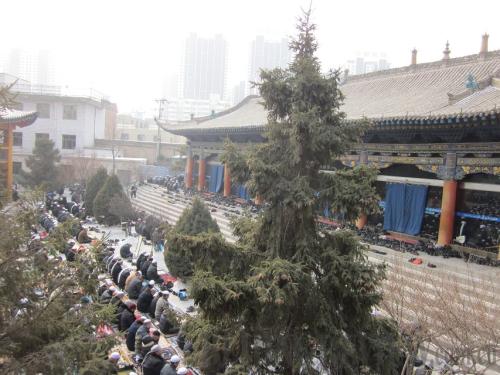|
 |
|
DEVOTION: Muslims pray in Dongguan Mosque's square in Xining on December 20, which marks the weekly Friday prayer (Jumu'ah) (PAN XIAOQIAO) |
Ma Futang is a 72-year-old man belonging to the Hui ethnic group. His home is near the Dongguan Mosque, which boasts a history of more than 600 years, as well as being the largest and best preserved mosque in Xining, capital city of northwest China's Qinghai Province.
Every day, Ma comes to the mosque on time. Sitting on his carpet alongside the square, he likes to chat with his peers there. In the warm sunshine, they wait for the start of the prayer ceremony.
Having retired and being provided with an ample pension, Ma now lives a leisurely life. His work consists of praying for the health and happiness of his family and also for the country that ensures him such a peaceful and happy life. Ma is a typical example of the 8,000 muslims who come to Dongguan Mosque to pray every day.
"I have been Muslim since I was very young. I come here to pray five times a day. No one interferes with our religious beliefs at all," Ma noted.
"With the city's rapid urbanization and expansion, more and more believers come to pray in our mosque," said Ma Zhi, Director of the Mosque's Management Council. "Our Friday prayer (Jumu'ah) usually receives 40,000 believers, and during festivals like Ramadan, we receive around 200,000."
China is home to more than 20 million Muslims, mainly consisting of the Hui, Uygur, and Kazak ethnic groups. Qinghai Province is home to around 1.2 million Muslims, accounting for about one fifth of the province's total population, making the province's Muslim population one of China's largest. The province has more than 1,400 mosques, and more than 2,800 imams have received religious teaching certificates issued by the China Islamic Association.
(Reporting from Qinghai Province) |
